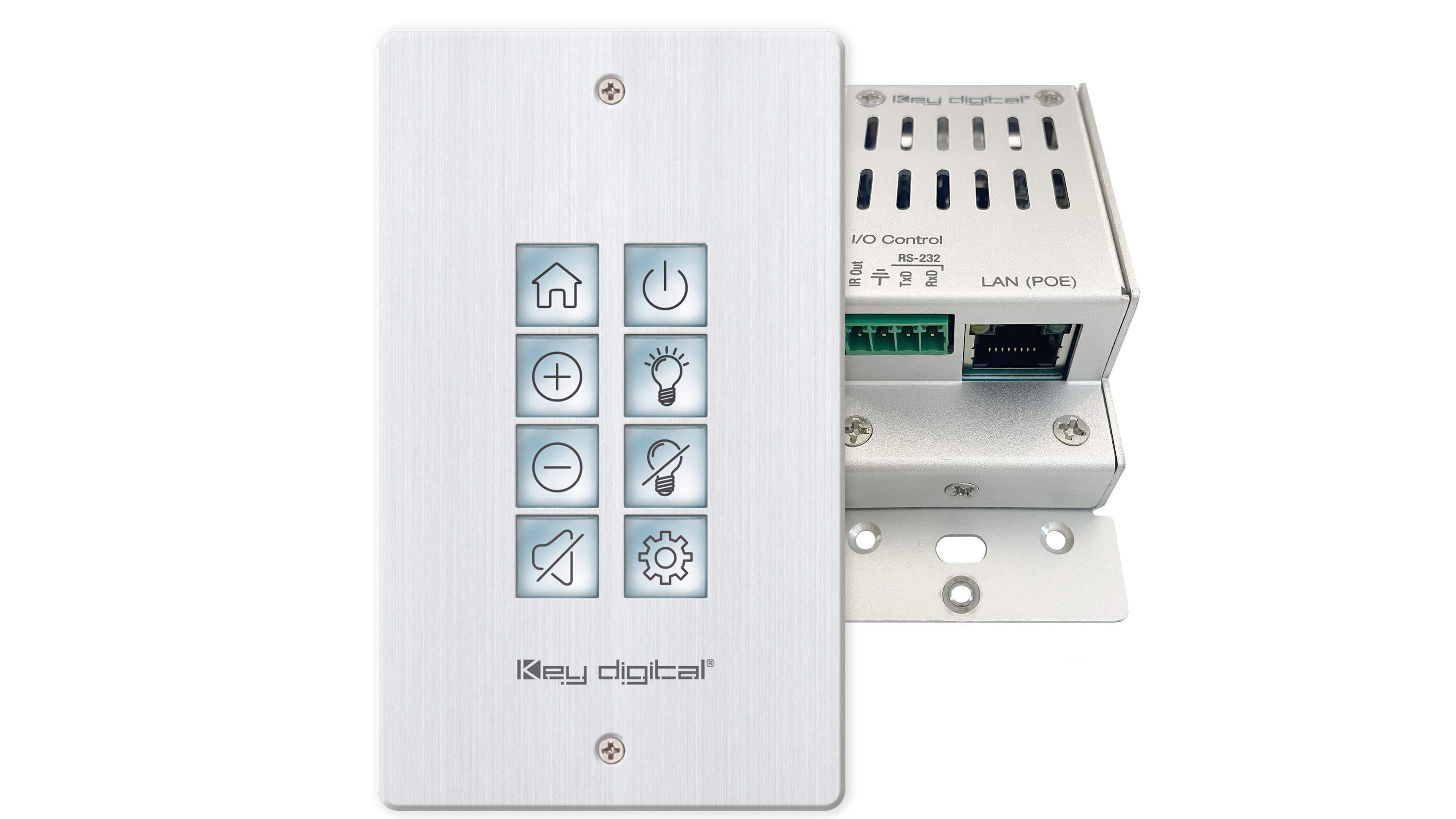
Key Digital has released its third-generation update of its KD-WP8 eight-button web-UI-programmable IP control wall plate keypad, featuring increased onboard memory for extended capability. The wall plate now supports Telnet and joins TCP and UDP as protocols the KD-WP8-3 can natively employ to send ASCII or HEX format commands as an IP controller.
"[Telnet is] used by many brands as a sophisticated and secure method for IP control of DSP processors and other products," explained Key Digital VP of product education and experience Jonathon Ferry. "With Telnet, the KD-WP8-3 can be programmed—without writing code or additional hardware—to make a connection with a device to be controlled then send a username and password to gain access to send control commands. Key Digital is firmly committed to ‘playing well with others’—providing interactive control across brand boundaries. Telnet support extends that commitment to a wider range of products.”
The KD-WP8-3 now also supports programming with variables. “That’s a big benefit when a device like a DSP processor or audio amplifier requires discrete number entry for control of a given parameter,” Ferry added. The KD-WP8-3 can be programmed to launch a salvo of commands from a single button push that can completely reconfigure a system. But without variable storage, “we were only able to send increment/decrement control,” Ferry explained, “such as volume plus or minus for an amplifier as opposed to stored preset values like integers from 0 to 100, with positive or negative designations if required. Continuing that example, we can now load a preset starting volume to an amplifier as we reconfigure a system, regardless of the current level setting from the last use of the amp. Again, the benefit is the capability to integrate with, and have more effective control of, a wider number of products.”
Simultaneous with the release of the controller update, Key Digital is making it easier to implement control of projectors compatible with the widely adopted PJLink standardized protocol for controlling projectors over ethernet. “Many of our customers use the WP8-3 to control projectors via PJLink already,” said Ferry. “Based on our combined experience, there are commonalities in the configuration of the KD-WP8-3 for projectors that are now covered by three pre-programmed files that customers can download and import to simply and elegantly configure a KD-WP8-3.” The three configuration options begin with an eight-button configuration of eight core commands that are all sent directly to the projector. The second pre-set uses the same button layout with the audio volume and muting commands routed to a Key Digital KD-Amp220 audio amplifier, while the third option routes the input selection control commands to Key Digital UCC or switcher devices.
The KD-WP8-3 fits into a single-gang wall box and is PoE powered. The keypad can control any IP-networked Key Digital device. Control extends to third-party systems and devices through the Compass Control Pro protocol, user-friendly Open API support, or directly from the KD-WP8-3’s integrated IR output and RS-232 port. Additional devices with IR, RS-232 and voltage relay control functionality may also be controlled through integration with one or more of Key Digital’s family of master controllers. As a result of Key Digital joining the Q-SYS Technology Partner Program, the KD-WP8-3 is compatible with Q-SYS via the jointly developed Q-SYS KD-WP8-3 Plugin.
The KD-WP8-3 is programmed by a simple web GUI walkthrough of network settings, button configuration, and event selection, with project import and export, which makes it easy to set up multiple control points or duplicate an entire system.
Button command stacking allows up to 10 commands on button press and release/repeat, for up to 20 events per button and 160 events total and a two-button press combo may be set to lock and unlock the keypad. Buttons can be programmed for various latching or momentary action modes and red or blue LED backlighting. Button cap icon sheets are provided, along with a template for custom printing.







